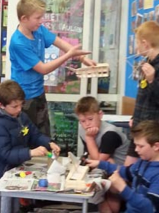
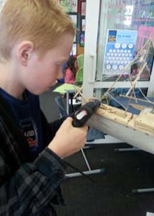
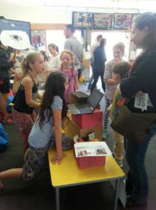
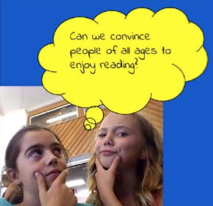
Albert Einstein said, ‘The true sign of intelligence is not knowledge but imagination.’ Genius Hour is a way of incorporating student passions as leverage for building imagination and problem solving in the modern classroom. Students at Hampden Street School in Nelson have the opportunity to spend over an hour a week on any project they choose. The model is based loosely around Google’s 20% time where employees are able to use 20% of their time to work on any project they are motivated to, as long as it advances the company. Schools across the globe are embracing Genius Hour as a way to utilise student passions to help school become a more creative and impactful place. At Hampden Street we have four rules for Genius Hour:
It must be framed as a driving question (Am I able to…? Can I learn more about…?)
There has to be an element of research involved.
It must have a purpose (Who will your project impact?)
You must share it (to your school community, or better still – with the world!)
Recent examples of projects include: students who are building a miniature version of the Endeavour, a documentary film about ‘What is creativity?’, a dance that blends Vietnamese and modern pop culture together, mural painting, creating recycled clothing and building a dog shelter for the SPCA. The projects students undertake are always surprising and varied.
Genius Hour promotes the need to use self, and time management skills. It encourages creativity, student reflection and accountability, as they are required to share at the end. It also promotes ‘big picture thinking’ because students are encouraged to think ‘globally’ with their project outcomes. I find that boys especially love the hands-on nature of Genius Hour.
Genius Hour is big, often loud, messy, and can appear chaotic. Some students struggle during the ideation stage of Genius Hour. A surprising number often find it difficult to realise their own passions and strengths so it’s important to give the students time to come up with ideas and even change their minds a few times. I encourage students to take risks with the topics they choose however this can mean that some are setting themselves up to fail. Learn to celebrate failure as something that can be celebrated and learned from for the next time.
What is the role of the teacher when the students are working independently of you? Your role is to motivate, to celebrate, to question and to challenge. Most importantly, know when to step in and help and when to leave students alone. Teachers can have an impactful role by driving the whole process along, almost like a cheerleader; motivating, celebrating and pushing students to take risks.
Generally we take a whole term for our projects. One or two weeks for ideation and planning, another week or two for research, and seven(ish) weeks for making/doing. I also provide 30 minutes a week for the students to work on their Google slideshow which is a place for them to document their progress. I encourage them to take photos of their projects week by week. It can also be a place to put in their research and bibliography.
We always plan a date in advance for sharing with our parents and classes within the school. It’s important to set an end date that the students work towards as this helps accountability and prevents the projects from ‘drifting’ too much. In the past students have also reached out to local journalists to promote their projects and goals of having an impact that is beyond the school.
Here are my top tips for making Genius Hour work in your classroom:
- Put a lot of time into the planning stages
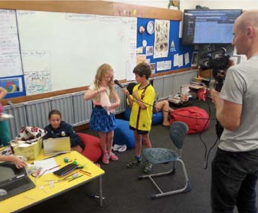
- Work hard to motivate/drive enthusiasm among the students
- Explain clearly to your parent community what you are doing
- Steer clear of fundraisers/projects involving money
- Let students fail
- Celebrate risk taking
- Don’t let your lack of expertise get in the way of student lead learning – they can do it without you!
- Take time to share/reflect at the end of each session
- Create a deadline and stick to it
- Take time to celebrate at the end and share success
Furthermore, take the time to read up about Genius Hour-as it really is a global phenomenon supported by a plethora of resources on the internet. The hashtag #geniushour on Pinterest and Twitter for example are full of great examples of schools across the world using Genius Hour. The Genius Hour live binder is full to the brim with information and examples from around the world. Australian teachers have recently launched geniushourfair.com which is a way to celebrate your best projects in a competition with other classes from around the world. I have set up a Google doc for NZ teachers to share their amazing projects with each other, so please feel free to put your details on, add to it. and get sharing. http://bit.ly/geniushournz
Genius Hour is the best thing you will do for your class this year, get on board – you won’t regret it!
